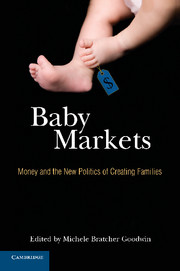Book contents
- Frontmatter
- Contents
- Preface
- Acknowledgments
- Introduction
- PART ONE WHAT MAKES A MARKET? EFFICIENCY, ACCOUNTABILITY, AND RELIABILITY OR GETTING THE BABIES WE WANT
- PART TWO SPACE AND PLACE: REPRODUCING AND REFRAMING SOCIAL NORMS OF RACE, CLASS, GENDER, AND OTHERNESS
- PART THREE SPECTRUMS AND DISCOURSES: RIGHTS, REGULATIONS, AND CHOICE
- PART FOUR THE ETHICS OF BABY AND EMBRYO MARKETS
- 15 Egg Donation for Research and Reproduction: The Compensation Conundrum
- 16 Eggs, Nests, and Stem Cells
- 17 Where Stem Cell Research Meets Abortion Politics: Limits on Buying and Selling Human Oocytes
- PART FIVE TENUOUS GROUNDS AND BABY TABOOS
- Author Bios
- Index
- References
17 - Where Stem Cell Research Meets Abortion Politics: Limits on Buying and Selling Human Oocytes
Published online by Cambridge University Press: 05 August 2012
- Frontmatter
- Contents
- Preface
- Acknowledgments
- Introduction
- PART ONE WHAT MAKES A MARKET? EFFICIENCY, ACCOUNTABILITY, AND RELIABILITY OR GETTING THE BABIES WE WANT
- PART TWO SPACE AND PLACE: REPRODUCING AND REFRAMING SOCIAL NORMS OF RACE, CLASS, GENDER, AND OTHERNESS
- PART THREE SPECTRUMS AND DISCOURSES: RIGHTS, REGULATIONS, AND CHOICE
- PART FOUR THE ETHICS OF BABY AND EMBRYO MARKETS
- 15 Egg Donation for Research and Reproduction: The Compensation Conundrum
- 16 Eggs, Nests, and Stem Cells
- 17 Where Stem Cell Research Meets Abortion Politics: Limits on Buying and Selling Human Oocytes
- PART FIVE TENUOUS GROUNDS AND BABY TABOOS
- Author Bios
- Index
- References
Summary
Today, there is a sound consensus among countries pursuing stem cell research in favor of limiting the extent to which women can be paid for providing oocytes for research. In addition to U.S. federal guidelines and state laws prohibiting compensation, Canadian law prohibits the “sale, offer to sell, or advertising to sell for money or exchange of property or services of sperm or ova.” The United Kingdom currently limits payment to gamete providers to fifteen pounds plus “reasonable” expenses. Even in Israel, which has an extraordinarily active stem cell research community, the report of the Bioethics Advisory Committee of the Israel Academy of Science and the Humanities on the use of embryonic stem cells for therapeutic research endorses only “voluntary donations” of oocytes.
This consensus against compensating women for oocytes is puzzling when considered against the broader backdrop of more commonplace market exchanges involving oocytes that proliferate in the context of assisted reproduction. This chapter undertakes a critical analysis of policies limiting compensation for women who provide oocytes to stem cell researchers.
To engage in this analysis, we begin with some background. First, we provide a brief overview of the manner in which oocytes are used in stem cell research. Second, we discuss the various laws and policies governing compensation for oocytes in two distinct contexts: stem cell research and assisted reproduction. This contrast reveals significant discrepancies in the way oocytes are treated.
- Type
- Chapter
- Information
- Baby MarketsMoney and the New Politics of Creating Families, pp. 250 - 264Publisher: Cambridge University PressPrint publication year: 2010



